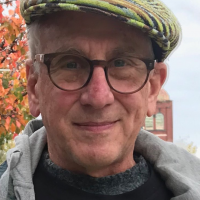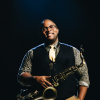Home » Jazz Articles » Profile » Stephen Philip Harvey: Big Band Superhero In the Making
Stephen Philip Harvey: Big Band Superhero In the Making

I just had a bug for big band music. Since I got to grad school that was my whole thing.
—Stephen Philip Harvey
There's a fine indiscipline to Harvey's big band writing. Ominous horror-film riffs sit comfortably alongside soaring album-rock guitar solos, urgent, cop-show horn fanfares and creamy unison sax-section passages straight out of the Thad Jones-Mel Lewis Orchestra's book. It's a fridge-raid omelette of sounds held together by the audaciousness of Harvey's conception and the joy with which his players bring it to life.
Harvey's non-aligned status with regard to musical borders might have something to do with the fact that his path to jazz started relatively late and generally avoided the orthodoxies of a conservatory jazz education. In fact, he avoided jazz altogether for a long time.
Harvey was born in Columbus, Ohio, but his family subsequently moved to Cleveland then Youngstown, Ohio before settling in Rochester, Pennsylvania, a town on the Ohio River northeast of Pittsburgh that despite it's small size (pop. 4000) had been home to Pro Football Hall of Famer Tony Dorsett, Olympic gold-medal sprinter Lauryn Williams and singer Christina Aguilera.
But there wasn't much music there. "We had one music venue and it was for pop punk and metal shows," Harvey said on a video interview from his home in Maryland where he teaches at Salisbury University. "They'd be doing covers of people like Taking Back Sunday and Fall Out Boy, so I really got into that music," he said.
At home, it was mostly classical music and neo-soul artists such as Jill Scott, Erykah Badu and Musiq Soulchild, but Harvey also grew up singing hymns. "It was my grandfather's favorite thing when he was alive, so we would always be singing," Harvey said.
That skill would prove to be crucial in his musical development, though, he said, "I didn't know that until I got to college. I just thought it was something that people did. I thought, I'm going to go to music school, and everyone's going to be able to [sing harmony], but it was a very select few of us and most of us were Black."
When Harvey enrolled in the undergraduate program at Seton Hill University, a small Catholic school near Pittsburgh, he intended to be an instrumental major, but didn't make his clarinet audition. "I had a panic attack during it and I was like, 'Hey, can I just sing?' And they were like, 'Yeah.' So I did," he said.
In addition to rescuing Harvey's undergraduate career, singing provided the young musician with enviable ear-training skills,. Yet when he entered Youngstown State's graduate music program, he did so with a composition portfolio, not with a saxophone audition. "They kind of gambled on me," Harvey admitted. "I got there and played for the first time, they were like, 'We've got some stuff to work on with you.'"
All the while, Harvey polished his compositional technique. "[Pianist] Theron Brown was my combo teacher the second year that I was there, and he really kicked my butt, kind of like a challenge," Harvey said. "I got to arrange some stuff, and I would bring it into rehearsal. We read it and sometimes we'd play it."
The "we" of which he spoke was a tight group of fellow students who form the core of the SPHJO to this day. To fill out the rest of the band, Harvey used an unusual strategy. "I did a lot of cold calling at first," he admitted. "I'd call and say, 'Hey, I admired your playing when I lived in Pennsylvania and Ohio. Do you want to play on this thing?"
It wasn't the easiest way to bring one's music to life, but Harvey said, "I just had a bug for big band music. Since I got to grad school that was my whole thing. I wrote quintet stuff for my combo but outside of that, all the things that I was writing were for big band or mixed ensemble instrumentation."
His work wasn't lost on his teachers. "Stephen was one of the hardest working students I've ever worked with," said bassist Dave Morgan, a professor at Youngstown State University. "I could tell he just had a lot of music in him and was just looking for the tools to develop his own voice. His final recital of his original music was one of the best evenings of music I've ever experienced, and that was kind of the launching pad for what he's doing now."
"There are so many people who want to play music and want to play new music," Harvey said. "Sometimes I feel like I worked my day job to fund the big bands. I'd worked for the whole year and then I put together some shows."
He finally assembled the band in 2019 and played a handful of shows. A New York debut was scheduled for early 2020, but "We know what happened in 2020," he said. Not deterred, Harvey finished a book of new music and wanted to record it. With touring on hold for the time being, he raised some money, convened the orchestra at Pittsburgh's Audible Images studio and tracked "Smash!"
The record's nine tracks might sometimes fall within the jazz tradition, but are never entirely of it, perhaps a consequence of Harvey's delayed encounter with that tradition.
"When I got to college my friends were into Wayne Shorter and I was like, Wayne who?" he said with a laugh. That first year one of my best friends said, 'Who is this idiot and why is he getting a degree in jazz studies? He does not know who these people are!'"
Having to play catch-up, Harvey stopped listening to the radio and threw himself into transcribing Lester Young solos. "I caught up on different big band writers specifically," he said. "I did a wider breadth of big band writers and a very large breadth of saxophonists, but outside of that there's still so many untapped resources of things that I have not studied. So people will talk about Steely Dan, and I understand what they are and their impact, but I've never sat down and really listened to them."
So the chugging, four-on-the-floor funk beat and leering trombone riffs on "Nefarious Plots" that recall the Dan's "Black Cow" have more to do with Marvel Comics' Black Panther. Indeed, the superhero theme that runs through the 68 minutes of Smash! includes some moments of darkness and conflict, but more often, as in the sunburst climax of the suite-like "The Mystics," of joy and light.
Darkness and light seems to be an eternal metaphor of the jazz life, one that Harvey acknowledges with grace. "I hate that a big band is so... big," he said with a chuckle. 'It's financially a problem, but I just really like big band music."
Tags
Profile
Stephen Philip Harvey
John Chacona
Fully Altered Media
United States
Pennsylvania
Pittsburgh
Thad Jones-Mel Lewis Orchestra
Columbus
Cleveland
Youngstown
Jill Scott
Erykah Badu
Musiq Soulchild
Theron Brown
Dave Morgan
New York
Wayne Shorter
Lester Young
steely dan
About Stephen Philip Harvey
Instrument: Composer / conductor
PREVIOUS / NEXT
Support All About Jazz
 All About Jazz has been a pillar of jazz since 1995, championing it as an art form and, more importantly, supporting the musicians who make it. Our enduring commitment has made "AAJ" one of the most culturally important websites of its kind, read by hundreds of thousands of fans, musicians and industry figures every month.
All About Jazz has been a pillar of jazz since 1995, championing it as an art form and, more importantly, supporting the musicians who make it. Our enduring commitment has made "AAJ" one of the most culturally important websites of its kind, read by hundreds of thousands of fans, musicians and industry figures every month.























